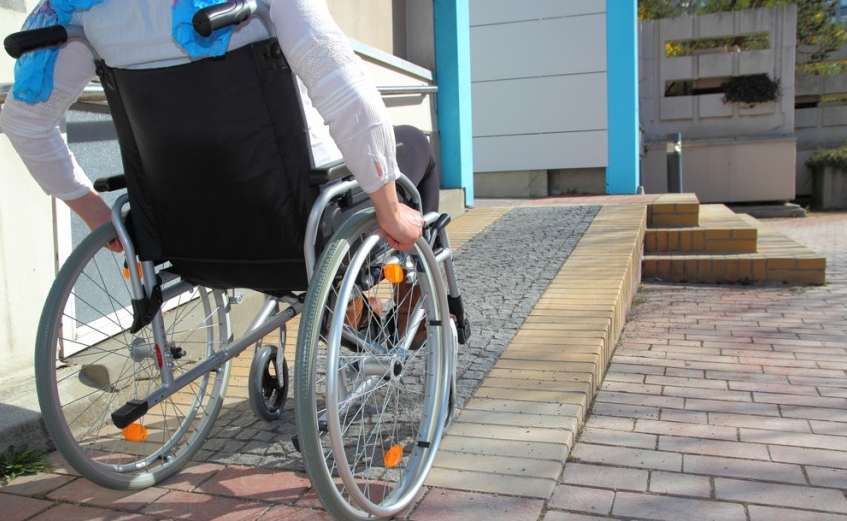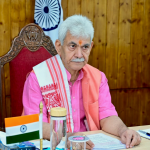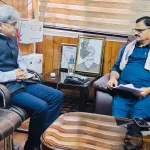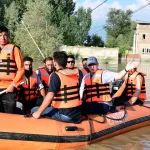INCLUSION & EMPOWERMENT
Education is a fundamental right for every child, and inclusive education where children with and without disabilities learn together in mainstream schools is essential for building a more equitable and just society. India’s landmark legislation, the Rights of Persons with Disabilities (RPWD) Act, 2016, Right to Education (RTE) Act of 2009 and New Education Policy NEP 2020 underscores this vision by mandating inclusive education and promoting the full participation of children with special needs (CWSN) in all aspects of life. However, in Jammu & Kashmir (J&K), as well as in many other states across India, several systemic, infrastructural, and socio-cultural barriers continue to impede the effective realization of quality inclusive education.
One of the most pressing challenges is the widespread refusal of all private schools to admit children with disabilities, despite legal mandates. Thousands of parents of CWSN are struggling to secure admission for their children in mainstream educational institutions. Many private schools, either due to lack of awareness, resources, or willingness, deny admission to children with disabilities openly violating the provisions of the RPWD Act.
This not only deprives these children of their right to education but also reinforces their social exclusion. The absence of strict enforcement mechanisms and accountability further enables such discriminatory practices to persist unchecked. Inclusive education is about providing equal opportunities for all children with special needs. Children with special needs should be included regardless of their age, gender, disability, or background.
Current Situation in J&K: Gaps between Policy and Practice
The Right of Persons with Disabilities Act 2016 (RPWD Act, 2016), is a progressive piece of legislation that replaced the earlier Persons with Disabilities (Equal Opportunities, Protection of Rights and Full Participation) Act of 1995. It expanded the recognized categories of disability from 7 to 21, reaffirmed the right to inclusive education, and mandated reasonable accommodations and barrier-free access to learning environments for children with special needs (CWSN).
In principle, this law guarantees CWSN the right to study in regular private or government schools with appropriate support systems. It places a legal obligation on educational institutions to adapt curriculum, train staff, appoint special educators, vocational training and involve other essential Rehab professionals, and modify infrastructure accessibility to meet the diverse needs of all learners. However, despite the strong legal framework, RPWD ACT 2016 implementation in Jammu & Kashmir continues to face significant challenges.
The Jammu & Kashmir government took a positive step by appointing a State Commissioner for Persons with Disabilities in October 2022 and designating nodal officers in every department to oversee disability related matters. Yet, the RPWD Act, 2016, remains far from fully implemented in the J&K. In Jammu and Kashmir thousands of children with special needs continue to be excluded from quality education, particularly in the critical early childhood years, which are essential for cognitive, emotional, and social development. Without timely intervention and inclusive early education, these children face long-term disadvantages, both educationally and socially.
The Government Education Department SAMAGRA initiative has started implementing inclusive education and has set up 3 to 4 Resource rooms for CWSN in each district, along with appointing few special educators and Resource persons. However, these resource rooms are often not fully equipped with necessary materials, and some are not functioning effectively without accessibility and ramps. Additionally, each district has only few resource rooms, making it difficult for special needs children to access them, especially in traveling from long distance in different rural areas. Jammu and Kashmir has 20 districts, yet parents of special needs are struggling to find well-equipped educational institutions in Jammu as well as Kashmir where every special need child received proper inclusive education.
Key Challenges to Inclusive Education in Jammu & Kashmir:
Lack of Trained Special Educators
One of the most pressing issues in J&K is the acute shortage of trained special educators in both government and private schools. While inclusive education policies and Supreme Court directions mandate the appointment of special educators in all CBSE, and other Govt schools, but all schools especially in the private sector fail to hire them altogether. As a result, there are no dedicated personnel to address the specific learning needs of children with special needs (CWSN). In private and government schools regular teachers, meanwhile, often lack the training to adapt teaching methodologies or offer individualized support. Although national policies recommend in-service training, such programs in the Union Territory remain inconsistent, sporadic, and severely underfunded.
Inadequate Infrastructure and Accessibility
Inclusive education demands barrier-free access both physically and digitally but this remains a significant challenge in J&K. Most schools lack essential infrastructure such as ramps, accessible toilets, tactile flooring, and audio-visual learning aids. The situation is even direr in rural and remote areas, where accessibility is often completely absent. According to recent data, the government has appointed only 70 special educators under the PM SHRI scheme, while an estimated one lakh CWSN in the region suffer from various disabilities. Expecting this small group of special educators to effectively support such a large and widely dispersed population is unrealistic and severely limits the quality of inclusive education.
Delayed and Poor Implementation of the RPWD Act
Although the Rights of Persons with Disabilities (RPWD) Act was enacted at the national level in 2016, its implementation in the Union Territory of Jammu & Kashmir has been notably slow and fragmented. The Act was formally notified in Jammu & Kashmir only in 2020, following the region’s reorganization into a Union Territory. However, even after this formal notification, the enforcement of several key provisions remains largely inadequate or limited to official documentation without meaningful execution on the ground.
Critical components of the Act such as the constitution of the State Advisory Board on disability, the appointment of dedicated District Education Officers for Inclusive Education, the establishment of a committee to assist the State Commissioner for Persons with Disabilities, and the creation of effective grievance redressal mechanisms have either been delayed, partially implemented, or overlooked altogether. This lack of concrete action has resulted in a significant gap between the promises enshrined in the legislation and the actual realization of rights and services for persons with disabilities in the region. Consequently, individuals with disabilities continue to face systemic barriers in accessing education, healthcare, employment, and social inclusion, undermining the very objectives of the RPWD Act.
Social Stigma and Lack of Awareness
Deep-rooted cultural attitudes and misconceptions about disability continue to hinder inclusive education. Many families still feel compelled to hide their children with disabilities due to fear of social stigma or community rejection. In schools, teachers may hold unconscious biases that result in the marginalization of CWSN in classrooms. Awareness and sensitization campaigns remain limited, especially in rural areas, and as a result, many children with disabilities are either not enrolled in schools or drop out prematurely due to lack of support and acceptance.
Insufficient Data and Weak Identification Mechanisms
Accurate and reliable data is essential for effective planning, resource allocation, and delivery of inclusive education services. However, in Jammu & Kashmir, data collection on Children with Special Needs (CWSN) remains irregular, inconsistent, and often inaccurate. Many children, especially those with mild to moderate disabilities, remain undiagnosed due to weak identification mechanisms and a lack of trained professionals. The absence of standardized screening tools and poor coordination between the education and health departments further delay early detection and timely intervention. As a result, a significant number of children miss out on vital educational support during their most formative years, affecting their long-term learning outcomes and social development.
Disability rights activist Umesh Sharma from Jammu has reported a concerning issue regarding the categorization of persons with disabilities, even after the introduction of the Unique Disability ID (UDID) cards. According to him, there are significant inaccuracies in the classification of disabilities on these cards. A particularly troubling example is the frequent mis-categorization of children with Autism Spectrum Disorder (ASD), who are often incorrectly labeled under Intellectual Disability (ID) or other unrelated categories.
This kind of misclassification not only undermines the unique needs of individuals with autism but also leads to distorted and unreliable data. As a result, policymakers face considerable challenges in designing effective interventions, allocating appropriate resources, and developing support systems that are tailored to specific disabilities. Such systemic errors ultimately hinder the goal of creating an inclusive and responsive framework for persons with disabilities, and there is an urgent need for corrective action to ensure that the UDID system accurately reflects the diverse spectrum of disabilities.
To truly realize the vision of inclusive education for children with special needs (CWSN) in Jammu & Kashmir, the following strategic actions are essential:
Strengthening Institutional Mechanisms
To ensure the effective implementation of the Rights of Persons with Disabilities (RPWD) Act, 2016, it is essential that fully functional and empowered institutional bodies are established at every administrative level. This includes the timely constitution of State and District-level Advisory Boards, formation of District Monitoring Committees, and the operationalization of Inclusive Education Cells within local educational departments and institutions. These bodies play a critical role in planning, monitoring, and facilitating services and programs for persons with disabilities, and their absence severely undermines the intent of the legislation.
The government should appoint District Education Officers for Inclusive Education, as over 625 in-service government teachers and masters have already completed specialized courses in special education under the erstwhile Sarva Shiksha Abhiyan (SSA), now known as Samagra Shiksha. These trained educators should be deputed as District Coordinators and District Education Officers to strengthen and promote better implementation of inclusive education across districts.
In addition, the office of the State Commissioner for Persons with Disabilities must take a proactive role in building awareness and promoting compliance with the provisions of the RPWD Act. One effective strategy would be to organize regular awareness workshops, training sessions, and sensitization programs across educational institutions, government departments, healthcare facilities, and other public and private sector organizations.
These initiatives would not only educate stakeholders about their responsibilities under the Act but also foster a more inclusive and rights-based approach to disability across the Union Territory. Empowering these bodies and spreading awareness is crucial for bridging the gap between policy and practice, and for ensuring that the rights of persons with disabilities are respected, protected, and fulfilled in a meaningful and sustainable manner.
Investing in Capacity Building
There is an urgent need to recruit and adequately train a cadre of special educators across the Union Territory. In addition, regular capacity-building and professional development programs must be organized for mainstream teachers to equip them with inclusive teaching strategies, classroom management techniques, and sensitivity toward the needs of CWSN.
Improving Infrastructure
A comprehensive audit of school infrastructure should be conducted to assess accessibility gaps. Based on the findings, targeted investments must be made to ensure schools are physically accessible through ramps, accessible toilets, tactile pathways, etc. and digitally inclusive by integrating assistive technologies such as screen readers, text-to-speech tools, and captioning systems into e-learning platforms.
Enhancing Community Engagement and Awareness
Combating social stigma and promoting inclusive values requires sustained community engagement. The government, in collaboration with civil society, NGOs should launch awareness campaigns to sensitize parents, teachers, and community leaders about the rights and potential of children with disabilities. Parental involvement should be actively encouraged through the formation of support groups, regular parent-teacher meetings, and community-based sensitization workshops.
Accurate Data Collection and Monitoring
Robust data collection systems must be established to accurately identify and track CWSN. Regular surveys, school-level data collection, and collaboration with healthcare providers can ensure that children with disabilities are diagnosed early and receive appropriate educational interventions. Disability-specific data should be integrated into school management and planning systems to support evidence-based decision-making.
Developing an Inclusive Curriculum and Teaching Aids
Curricula should be revised and adapted to accommodate a wide range of learning needs and abilities. This includes simplifying content, using multi-sensory teaching techniques, and designing flexible assessment systems. Additionally, accessible teaching and learning materials such as Braille textbooks, audio books, large-print materials, sign language interpreters, and visual aids must be made available across all schools.
Conclusion
Jammu & Kashmir stands at a critical juncture in its journey toward achieving truly inclusive and equitable education. The Rights of Persons with Disabilities (RPWD) Act, 2016, provides a strong and comprehensive legal framework to uphold the educational rights of children with special needs (CWSN). However, the full potential of this legislation remains largely unrealized due to significant implementation gaps, lack of accountability, and insufficient resource allocation.
Bridging these gaps requires a sustained, multi-stakeholder effort involving not just government authorities, but also educators, civil society organizations, parents, and the wider community. A collaborative approach is essential to dismantle the systemic and attitudinal barriers that continue to marginalize children with disabilities in the education system.
Inclusive education is not merely about integrating CWSN into regular classrooms it is about creating a learning environment where diversity is celebrated, individual needs are respected, and all children are given equal opportunities to reach their full potential. By strengthening institutional mechanisms, investing in training, improving infrastructure, raising awareness, and fostering accountability, Jammu & Kashmir can pave the way for a more inclusive and compassionate educational landscape.
Through collective commitment and action can we ensure that no child regardless of their ability or disability is left behind. Inclusive education must move from being a policy promise to a lived reality for every child in the region.
(The Author is Sr. Pediatric Rehab Therapist & Social Worker (MSW) Working for Disability & Child Rights. Feedback: [email protected])








